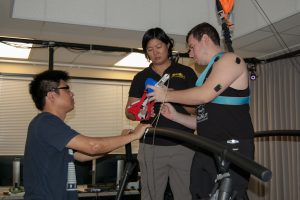UCF’s New Biomedical Engineering Doctoral Degree Will Advance Research Careers

As a child, Madisyn Messmore ’22 was fascinated by the human body and how it worked. She planned to become a neurosurgeon, but her career path shifted directions in college when an internship with the UCF-based nonprofit Limbitless Solutions piqued her interest in engineering. After she started the internship, she learned that a family member was dealing with a health problem — and she wanted to find a treatment or cure. But as a senior mechanical engineering major, she didn’t know where to start.
Under the mentorship of Pegasus Professor Alain Kassab, Messmore shifted career paths once again, this time in the direction of biomedical engineering, a field that combines her passions for both medicine and engineering. Now Messmore, is one of the first students to pursue a doctoral degree in biomedical engineering at UCF.
The doctorate in biomedical engineering, which launched in Fall 2022, is the newest degree offered through the Department of Mechanical and Aerospace Engineering in the College of Engineering and Computer Science. The program is designed to prepare students for research and development careers in the biomedical industry, government labs and organizations and academia.
Supporting the Industry
The program also supports the demand for a workforce with advanced biomedical engineering knowledge and skills. The U.S. Bureau of Labor Statistics projects that employment of biomedical engineers and bioengineers will increase steadily throughout the decade. Florida is also among the states with the highest employment in this field.
One employer of biomedical engineers is the company .decimal, which manufactures devices and develops software that can assist with the treatment of cancer. Kevin Erhart ’04 ’06MS ’09PhD, the president and chief technology officer of the company, says that the pipeline of students from UCF to industry can be invaluable to small companies like his.
“Having local Ph.D. students engaged in work within our fields of interest would open the door to collaborative projects where students solve novel problems and companies commercialize the results through their existing sales and marketing channels,” Erhart says. “Students will hopefully be better exposed to real-world research and development and also have opportunities to interact with local companies that would have significant interest in hiring them upon graduation.”
Opportunities for Growth
Students are exposed to real-world research opportunities in faculty labs at both CECS and the College of Medicine, and they also have the chance to engage in research projects with local medical professionals. Steven Scheller, who joined the program when it launched in Fall 2022, says that it provides an in-depth look at what it takes to design and develop medical devices that doctors and patients use every day.
“In many cases, doctors will have the medical knowledge and desire to improve a device or develop a new device to help fellow medical professionals and patients,” he says. “However, they lack the engineering background and expertise to determine how to go about designing and building a device. I want to be a physician who is able to bridge this gap. I want to have both the medical and engineering knowledge and skill necessary to take an idea I have to invent or improve a medical device, design, build, and test it in order to dramatically improve patients’ lives.”
When it comes to their area of study, students can tailor the degree program to their interests, which Messmore says sets it apart from similar doctoral programs.
“Since biomedical engineering is a very rapidly advancing field and is also so broad, the degree maintains the balance of requiring fundamentals in the field but allowing people to tailor their electives to whatever subfield they wish,” Messmore says. “It’s great because it doesn’t limit anyone to a specific specialty, and you can pursue whatever you desire – biomechanics, biofluids or even regenerative medicine – all while working with world-class faculty.”
Students are also not limited in how they enter the program. Graduates with a master’s degree can apply as can graduates with a bachelor’s degree who would like to earn a master’s degree along the way.
The First Alum — With Many More to Come
Currently, nine students are enrolled in the program, which will soon boast its first alumnus. Jinfeng Li ’19MS ’PhD transferred from the mechanical engineering doctoral program to biomedical doctoral program last fall. He will graduate in Spring 2023 under the tutelage of Associate Professor Helen Huang.


“Compared to other programs, the biomedical engineering Ph.D. program is a highly interdisciplinary program that trains students to solve biomedical problems with engineering approaches,” Li says. “This program has many faculty members who are rising stars, accompanied with outstanding resources from the main campus and Lake Nona, and offers diverse career opportunities.”
Li may be the first alumnus of the biomedical doctoral program, but he certainly won’t be the last. Tamar Yishay ’20 ’21MS is one future graduate of the program and a current alumna of UCF. She says the program will give her more exposure to the clinical work environment and will allow her to build off of her previous work in the undergraduate biology and master’s in nanotechnology programs.
“As I strive to strengthen and cultivate my niche in the science world, the pursuit of a biomedical engineering Ph.D. will inspire me to continue to develop my identity within the UCF community and to bring about revolutionary contributions to the art of science and medicine,” Yishay says. “Moreover, it provides an exciting journey to healthy living, which is what I hope to embody throughout my career and life.”
The deadline for applications for the doctorate in biomedical engineering program are due July 1 for fall and December 1 for spring. For more information about the program, visit mae.ucf.edu/bmephd.



